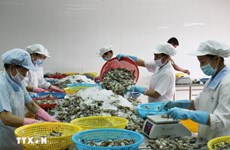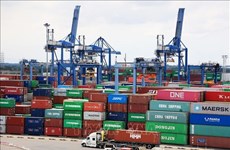Shrimp exports hit record high
Shrimp exports reached record levels this year with overseas sales bringing in more than 2 billion USD.
Shrimp exports reached record levels this year with overseas sales bringing in more than 2 billion USD.
This was a substantial increase on the 1.69 billion USD earned last year, said the Vietnam Association of Seafood Exporters and Producers (VASEP).
"The record high export value was fuelled by higher quality shrimp farming practices this year," said Nguyen Huu Dung, VASEP deputy chairman.
"Shrimp exports continued to grow this year despite the world economic downturn and market uncertainty."
"In the first 11 months, Vietnam exported 210,000 tonnes of shrimp, meaning earnings of 1.83 billion USD," said Nguyen Minh Tam, a VASEP expert.
"Shrimp were very much in demand in almost all the main export markets, including Japan, the US and the European Union (EU) so the volume to those markets increased sharply," Tam said.
Exports to Japan, the largest export market, had a year-on-year volume increase of 21.7 percent, for a total of 60,000 tonnes. Earnings were up 29 percent to 550 million USD, she said.
The US, the second largest export market, consumed 42,441 tonnes of Vietnamese shrimp, bringing in earnings of 450 million USD. These exports soared by 16 percent in volume and 34.6 percent in value compared with the same period last year.
Meanwhile, domestic exporters shipped 40,000 tonnes of shrimp to the EU in the first 11 months, earning 290 million USD. Exports rose by 8.1 percent in volume and 16.8 percent in value against the first 11 months of last year.
The growth in shrimp export value was partly the result of increases in the price of shrimp on the world market, Tam said. The current export price was 8,530 USD per tonne compared with 5,017 USD per tonne a year ago.
The price of shrimps had also reached record level on the domestic market, said Tam.
In southernmost province Ca Mau , the price jumped by between 11 percent and 36 percent depending on quantity bought.
For purchases of 40 kilograms of shrimp, the price per kilo was 130,000 VND.
The price increase on the domestic market was the result of low supply, said the Ministry of Agriculture and Rural Development (MARD). The amount of land given over to shrimp farming had dropped 16,000ha to 550,600ha in the Mekong Delta region.
To solve the problem, provinces in the region should diversify their shrimp rearing techniques. They should also encourage farmers to work together to ensure the sustainable development of the shrimp industry, said MARD deputy minister Luong Le Phuong./.
This was a substantial increase on the 1.69 billion USD earned last year, said the Vietnam Association of Seafood Exporters and Producers (VASEP).
"The record high export value was fuelled by higher quality shrimp farming practices this year," said Nguyen Huu Dung, VASEP deputy chairman.
"Shrimp exports continued to grow this year despite the world economic downturn and market uncertainty."
"In the first 11 months, Vietnam exported 210,000 tonnes of shrimp, meaning earnings of 1.83 billion USD," said Nguyen Minh Tam, a VASEP expert.
"Shrimp were very much in demand in almost all the main export markets, including Japan, the US and the European Union (EU) so the volume to those markets increased sharply," Tam said.
Exports to Japan, the largest export market, had a year-on-year volume increase of 21.7 percent, for a total of 60,000 tonnes. Earnings were up 29 percent to 550 million USD, she said.
The US, the second largest export market, consumed 42,441 tonnes of Vietnamese shrimp, bringing in earnings of 450 million USD. These exports soared by 16 percent in volume and 34.6 percent in value compared with the same period last year.
Meanwhile, domestic exporters shipped 40,000 tonnes of shrimp to the EU in the first 11 months, earning 290 million USD. Exports rose by 8.1 percent in volume and 16.8 percent in value against the first 11 months of last year.
The growth in shrimp export value was partly the result of increases in the price of shrimp on the world market, Tam said. The current export price was 8,530 USD per tonne compared with 5,017 USD per tonne a year ago.
The price of shrimps had also reached record level on the domestic market, said Tam.
In southernmost province Ca Mau , the price jumped by between 11 percent and 36 percent depending on quantity bought.
For purchases of 40 kilograms of shrimp, the price per kilo was 130,000 VND.
The price increase on the domestic market was the result of low supply, said the Ministry of Agriculture and Rural Development (MARD). The amount of land given over to shrimp farming had dropped 16,000ha to 550,600ha in the Mekong Delta region.
To solve the problem, provinces in the region should diversify their shrimp rearing techniques. They should also encourage farmers to work together to ensure the sustainable development of the shrimp industry, said MARD deputy minister Luong Le Phuong./.













